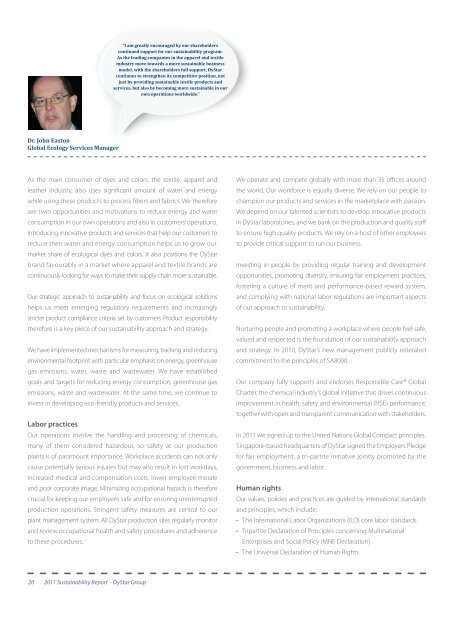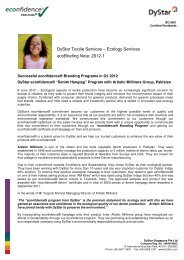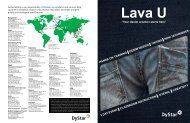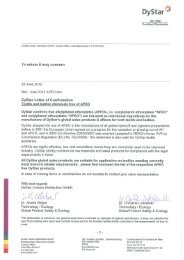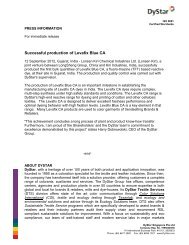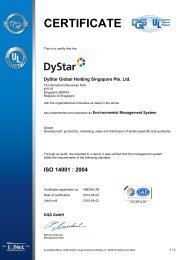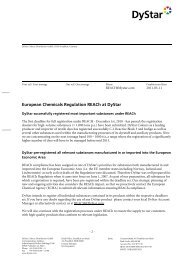Read the DyStar Sustainability Report 2011...
Read the DyStar Sustainability Report 2011...
Read the DyStar Sustainability Report 2011...
You also want an ePaper? Increase the reach of your titles
YUMPU automatically turns print PDFs into web optimized ePapers that Google loves.
Dr. John Easton<br />
Global Ecology Services Manager<br />
As <strong>the</strong> main consumer of dyes and colors, <strong>the</strong> textile, apparel and<br />
lea<strong>the</strong>r industry, also uses significant amount of water and energy<br />
while using <strong>the</strong>se products to process fibers and fabrics. We <strong>the</strong>refore<br />
see twin opportunities and motivations to reduce energy and water<br />
consumption in our own operations and also in customers’ operations.<br />
Introducing innovative products and services that help our customers to<br />
reduce <strong>the</strong>ir water and energy consumption helps us to grow our<br />
market share of ecological dyes and colors. It also positions <strong>the</strong> <strong>DyStar</strong><br />
brand favourably in a market where apparel and textile brands are<br />
continuously looking for ways to make <strong>the</strong>ir supply chain more sustainable.<br />
Our strategic approach to sustainability and focus on ecological solutions<br />
helps us meet emerging regulatory requirements and increasingly<br />
stricter product compliance criteria set by customers. Product responsibility<br />
<strong>the</strong>refore is a key piece of our sustainability approach and strategy.<br />
We have implemented mechanisms for measuring, tracking and reducing<br />
environmental footprint with particular emphasis on energy, greenhouse<br />
gas emissions, water, waste and wastewater. We have established<br />
goals and targets for reducing energy consumption, greenhouse gas<br />
emissions, waste and wastewater. At <strong>the</strong> same time, we continue to<br />
invest in developing eco-friendly products and services.<br />
Labor practices<br />
Our operations involve <strong>the</strong> handling and processing of chemicals,<br />
many of <strong>the</strong>m considered hazardous, so safety at our production<br />
plants is of paramount importance. Workplace accidents can not only<br />
cause potentially serious injuries but may also result in lost workdays,<br />
increased medical and compensation costs, lower employee morale<br />
and poor corporate image. Minimizing occupational hazards is <strong>the</strong>refore<br />
crucial for keeping our employees safe and for ensuring uninterrupted<br />
production operations. Stringent safety measures are central to our<br />
plant management system. All <strong>DyStar</strong> production sites regularly monitor<br />
and review occupational health and safety procedures and adherence<br />
to <strong>the</strong>se procedures.<br />
20 2011 <strong>Sustainability</strong> <strong>Report</strong> - <strong>DyStar</strong> Group<br />
“I am greatly encouraged by our shareholders<br />
continued support for our sustainability program.<br />
As <strong>the</strong> leading companies in <strong>the</strong> apparel and textile<br />
industry move towards a more sustainable business<br />
model, with <strong>the</strong> shareholders full support, <strong>DyStar</strong><br />
continues to streng<strong>the</strong>n its competitive position, not<br />
just by providing sustainable textile products and<br />
services, but also by becoming more sustainable in our<br />
own operations worldwide.”<br />
We operate and compete globally with more than 35 offices around<br />
<strong>the</strong> world. Our workforce is equally diverse. We rely on our people to<br />
champion our products and services in <strong>the</strong> marketplace with passion.<br />
We depend on our talented scientists to develop innovative products<br />
in <strong>DyStar</strong> laboratories, and we bank on <strong>the</strong> production and quality staff<br />
to ensure high quality products. We rely on a host of o<strong>the</strong>r employees<br />
to provide critical support to run our business.<br />
Investing in people by providing regular training and development<br />
opportunities, promoting diversity, ensuring fair employment practices,<br />
fostering a culture of merit and performance-based reward system,<br />
and complying with national labor regulations are important aspects<br />
of our approach to sustainability.<br />
Nurturing people and promoting a workplace where people feel safe,<br />
valued and respected is <strong>the</strong> foundation of our sustainability approach<br />
and strategy. In 2010, <strong>DyStar</strong>’s new management publicly reiterated<br />
commitment to <strong>the</strong> principles of SA8000.<br />
Our company fully supports and endorses Responsible Care® Global<br />
Charter, <strong>the</strong> chemical industry’s global initiative that drives continuous<br />
improvement in health, safety and environmental (HSE) performance,<br />
toge<strong>the</strong>r with open and transparent communication with stakeholders.<br />
In 2011 we signed up to <strong>the</strong> United Nations Global Compact principles.<br />
Singapore-based headquarters of <strong>DyStar</strong> signed <strong>the</strong> Employers’ Pledge<br />
for fair employment, a tri-partite initiative jointly promoted by <strong>the</strong><br />
government, business and labor.<br />
Human rights<br />
Our values, policies and practices are guided by international standards<br />
and principles, which include;<br />
• The International Labor Organization’s (ILO) core labor standards<br />
• Tripartite Declaration of Principles concerning Multinational<br />
Enterprises and Social Policy (MNE Declaration)<br />
• The Universal Declaration of Human Rights


